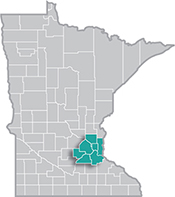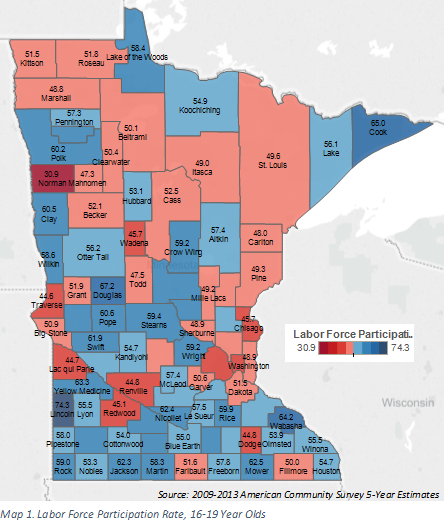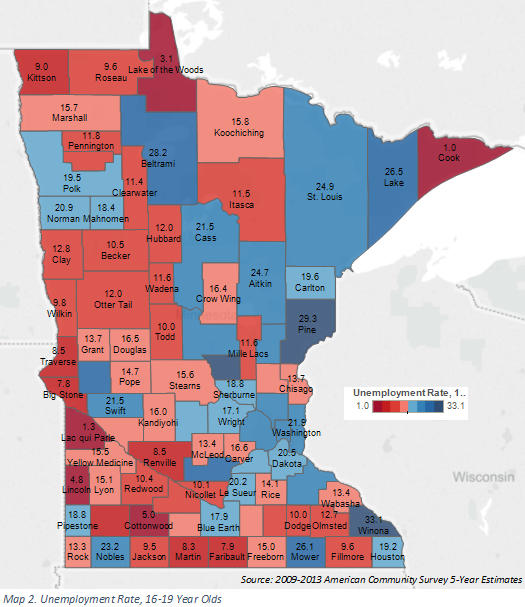 The Minneapolis-St. Paul metropolitan area is a national leader in finance, advanced manufacturing, agriculture and retailing.
The Minneapolis-St. Paul metropolitan area is a national leader in finance, advanced manufacturing, agriculture and retailing.
Medical devices, electronics and processed foods are strong suits recognized globally.
Want the freshest data delivered by email? Subscribe to our regional newsletters.
5/13/2015 2:23:55 PM
Tim O'Neill
As schools begin to let students out for the summer and business continue to post "help wanted" signs for workers, the potential for teens to find summer employment is warming up with the weather.
Teenagers provide a welcome bump in the available labor force across Minnesota, especially since Minnesota's unemployment rate lingering below 4 percent for several months has left employers with fewer available workers to choose from. The good news is that Minnesota has the seventh-highest labor force participation rate for teenagers in the country, at 48.5 percent (compared to about 33 percent nationally, according to the American Community Survey).
The labor force participation rate for teens was slightly lower in the Twin Cities metro area than the state, where nearly half of people (47.1 percent) aged 16-19 in the Twin Cities were in the labor force over the last 5 years. That 47.1 percent represents an estimated 72,670 teenage workers, which was about 4.4 percent of the total metro area labor force.
Teenage workers in the metro area accounted for nearly half (48.5 percent) of all teenage workers in the state. Teenage labor force participation rates throughout the metro ranged from a low of 44.6 percent in Ramsey County to a high of 52.8 percent in Scott County. Dakota and Scott counties both had teenage labor force participation rates higher than the state average of 50.9 percent (see Map 1).

Not surprisingly, teens are most likely to work in the accommodation and food services and retail trade industries, which together account for about two-thirds of jobs held by teenagers. Data shows that teens also find jobs in other industries, such as: health care and social assistance, which includes child day care services and nursing and residential care facilities; other services, which includes personal care, pet care, civic and social organizations, and repair and maintenance; arts, entertainment and recreation, which includes amusement parks, golf courses, and sports teams; and public administration, which includes local government services.
"Prospects for teenagers finding jobs this summer are better than in recent years, primarily because of an improving economy and tighter labor market," said Oriane Casale of DEED's Labor Market Information Office. "With strong employment growth in both the retail and the accommodation and food service sectors in March, this might be a great summer for teens in Minnesota to get some work experience and earn their first paychecks."
Of the 72,670 teenaged workers in the metro, just over 16,770 were considered unemployed and actively seeking work. That means teens in the Twin Cities metro area had an unemployment rate of 23.1 percent in 2013, which was over three times higher than the unemployment rate for the total population. The Twin Cities metro area also held over half of the total unemployed teens in the entire state of Minnesota. While this may seem high in comparison, the state's 11.3 percent unemployment rate for teens was the sixth lowest nationally in 2014. The new figures are an improvement from teen jobless rates that surged to more than 20 percent during the recession.
Carver (16.6 percent), Dakota (20.5 percent), and Scott (20.7percent) counties had the lowest teen unemployment rates in the Twin Cities metro area. Hennepin (24.8 percent) and Ramsey (24.8 percent) counties had the highest jobless rates for teens (see Map 2). Employers in these counties may have an easier time recruiting teenagers to fill their jobs this summer.

DEED offers services and programs to help teens find work. The agency's MinnesotaWorks.net job bank lists nearly 84,000 jobs, many of them suitable for teenagers. Job opportunities also are available through DEED's youth employment, training and education programs.
Contact Tim O'Neill at 651-259-7401.